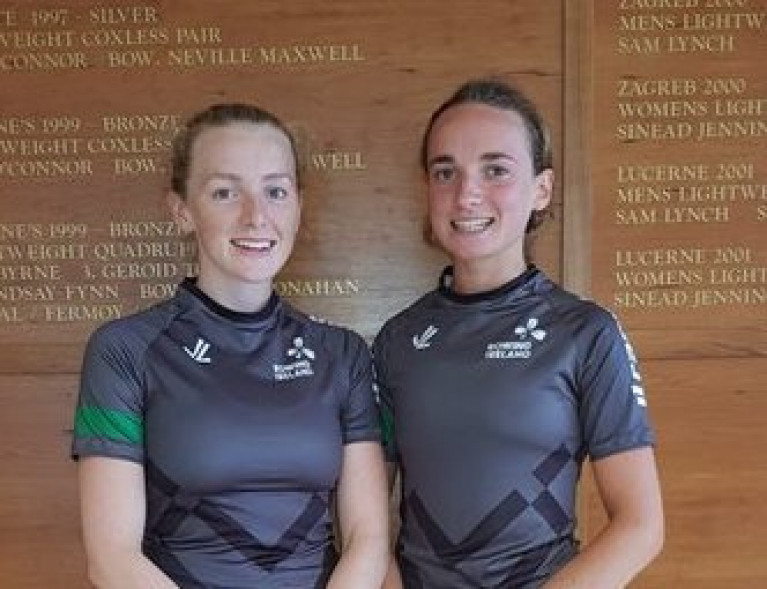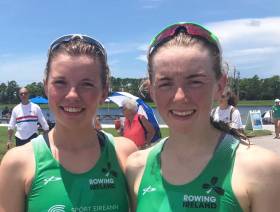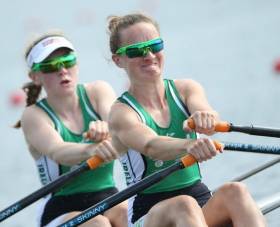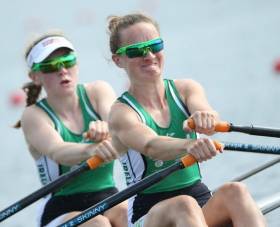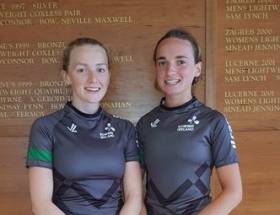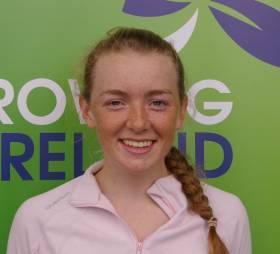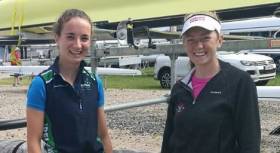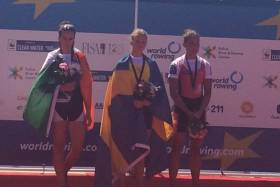Displaying items by tag: Casey
Two superb performances by lightweight doubles got Ireland off to an excellent start on day two of the European Rowing Championships in Varese today.
The men’s crew of Paul O’Donovan and Fintan McCarthy would go on to have a great win in their semi-final, but Aoife Casey and Margaret Cremen deserve the plaudits for taking second in their semi-final.
This crew is aimed at the Olympic Qualification regatta next month in Lucerne and looked to be an outside bet initially. Their performances at this regatta changed that.
In today’s semi, they showed great maturity. Italy took over early and were never headed, while Russia and Ireland tracked them in second and third. But the final quarter Ireland pushed through into a firm second place.
Cremen and Casey take their place in the A Final on Sunday. The other semi-final, won by Britain from the Netherlands, looked stronger, but Ireland even have an outside chance of a medal.
McCarthy and O’Donovan were favourites for gold right from the start. Doubts, if there were some, related to the ability of the 2019 World Champions to turn it on again after effectively missing the 2020 season, such as it was.
They had a real test in Italy, who led early and might have expected another battle in the closing stages. It never happened. Coming up to halfway, McCarthy and O’Donovan zoomed past the men in blue. They opened up the lead to clearwater and won.
Germany, who won the other semi-final, will contend on Sunday. However, their winning time was slower than the Irish today.
The Ireland double of Philip Doyle and Ronan Byrne were well off the pace in their semi-final and finished sixth. France, Britain and Switzerland got off to good starts and duly took the A Final places. Ireland had a poor start. They tried to move into contention in the middle stages but could not get a hold on the contest.
Daire Lynch qualified for the C Final (places 13 to 18) of the men’s single sculls, taking second in his semi-final.
European Rowing Championships, Varese, Italy – Day Two (Irish interest)
Men
Double Sculls – A/B Semi-Final (First Three to A Final; rest to B Final): 1 France 6:10.26, 2 Britain 6:11.17, 3 Switzerland 6:12.79; 6 Ireland (P Doyle, R Byrne) 6:21.38.
Lightweight Double Sculls – A/B Semi-Final (First Three to A Final; rest to B Final): 1 Ireland (F McCarthy, P O’Donovan) 6:22.74, 2 Italy 6:25.53, 3 Czech Republic 6:27.14.
Single Sculls – C/D Semi-Final Two (First Three to C Final; rest to D Final): 2 Ireland (D Lynch) 7:02.22.
Women
Lightweight Double Sculls – A/B Semi-Final (First Three to A Final; rest to B Final): 1 Italy 7:11.44, 2 Ireland (A Casey, M Cremen) 7:14.44, 3 Russia 7:15.46.
Fourth for Casey and Nolan at World Under-23 Championships
#Rowing: Ireland took fourth in the lightweight women’s double at the World Under-23 Championships in Florida. Aoife Casey and Cliodhna Nolan raced from sixth to fourth in the second half of this A Final, which was won well by Switzerland from the Netherlands and Germany.
World Rowing Under-23 Championships, Sarasota Bradenton, Florida (Irish interest)
Women
Four – A Final: 1 Britain 6:34.22, 2 Ireland (C Feerick, E Lambe, T Hanlon, E Hegarty) 6:35.68, 3 United States 6:39.89.
Lightweight Double Sculls – A Final: 1 Switzerland 7:03.83, 2 Netherlands 7:09.45, 3 Germany 7:09.56; 4 Ireland (A Casey, C Nolan) 7:15.40.
Ireland in Three Finals at World Rowing Awards
#Rowing: Sanita Puspure, the O’Donovan brothers and Ireland lightweight coach Dominic Casey have all been chosen as finalists for the World Rowing Awards 2018. Puspure won gold in the women’s single sculls and Paul and Gary O’Donovan won the lightweight double, coached by Casey, at the World Rowing Championships.
Just two crews, along with Puspure, are in the running for Women’s Crew of the Year, while there are four crews in the finals of Men’s Crew of the Year and for Coach of the Year. Casey has reached the final three years in-a-row.
The awards will be presented on November 23rd in Berlin.
Finalists for the 2018 World Rowing Awards
Women’s Crew of the Year
- Caileigh Filmer, Hillary Janssens, Canada, Women’s pair
- Sanita Puspure, Ireland, Women’s single sculls
- Agnieszka Kobus-Zawojska, Marta Wieliczko, Maria Springwald, Katarzyna Zillmann, Poland, Women’s quadruple sculls
Men’s Crew of the Year
- Joshua Hicks, Spencer Turrin, Jack Hargreaves, Alexander Hill, Australia, Men’s four
- Jason Osborne, Germany, Lightweight men’s single sculls
- Johannes Weissenfeld, Felix Wimberger, Maximilian Planer, Torben Johannesen, Jakob Schneider, Malte Jakschik, Richard Schmidt, Hannes Ocik, Martin Sauer (coxswain), Germany, Men’s eight
- Paul O’Donovan, Gary O’Donovan, Ireland, Lightweight men’s double sculls
Para-rowing Crew of the Year
- Perle Bouge, France, Para PR2 women’s single sculls
- Ellen Buttrick, Grace Clough, Oliver Stanhope, Daniel Brown, Erin Wysocki-Jones (coxswain), Great Britain, Para PR3 mixed coxed four
- Annika van der Meer, Corne de Koning, Netherlands, Para PR2 mixed double sculls
Coach of the Year
- Uwe Bender, Germany, Men’s eight
- Dominic Casey, Ireland, Men’s pair, lightweight men’s and women’s double sculls, lightweight men’s quadruple sculls
- Jan Klerks, Netherlands, Para-rowing team
- Laurel Korholz, United States, Women’s four, women’s single sculls
2018 Sustainability Award
- “Pushing for a Clean Sweep”, National Schools Regatta, Great Britain
- “Partnership with Waikato Water Authority”, Rowing NZ, New Zealand
- “Love Where you Row”, Alan Robinson/Schuylkill Navy, United States
Skibbereen Men Popular on Awards Circuit
#Rowing: The awards season is proving a fruitful one for rowers. Mark O’Donovan and Shane O’Driscoll were honoured at the Canon Hayes Centre awards and fellow Skibbereen man Paul O’Donovan has been nominated for the RTÉ Sportsperson of the Year award. All three won gold medals at the 2017 World Championships.
Ireland coach Dominic Casey was also nominated for the World Rowing Coach of the Year at the World Rowing Awards. Casey and Morten Espersen, the former Ireland high peformance director, were also nominated for Distinguished Service to International Rowing.
On the night, the France coach Alexis Besancon was chosen as Coach of the Year. John Boultbee of Australia won the Distinguished Service to International Rowing.
The Male Crew of the Year were the German eight, Female Crew of the Year was single sculler Jeannine Gmelin and World Para Crew of the Year went to Birgit Skarstein of Norway.
Cremen and Casey are Rowers of the Month
#Rowing: The Afloat Rowers of the Month for August are Margaret Cremen and Aoife Casey. The Ireland double finished seventh at the World Rowing Junior Championships. The Lee/Skibbereen duo reached the semi-finals in Trakai, Lithuania, but while they could not make the top six they were impressive winners of the B Final, where France tested them. Amongst the countries which did not reach the last 12 were Australia, New Zealand, the United States and China. Twenty-eight countries competed in this discipline.
Cremen and Casey had taken a silver medal at the European Junior Championships in Germany in May. It was another highlight of an exceptional season. Ireland underage crews have been part of the general rise: so far they have taken two medals at the World Under-23 Championships and five at the Coupe de la Jeunesse, a European junior tournament.
Rower of the Month awards: The judging panel is made up of Liam Gorman, rowing correspondent of The Irish Times, and David O'Brien, editor of Afloat magazine. Monthly awards for achievements during the year will appear on afloat.ie. Keep a monthly eye on progress and watch our 2017 champions list grow.
#Rowing: Ireland’s double of Margaret Cremen and Aoife Casey won their B Final this morning at the World Rowing Junior Championships in Trakai, Lithuania. The race developed very early into a battle between France and Ireland, with Ireland less than a boat length ahead for much of the 2,000 metres. In the sprint finish, France could not overtake the Irish women.
The result places Ireland seventh overall of the 28 crews which started.
World Junior Championships, Day Five, Irish interest
Women
Junior Double Sculls – B Final (Places 7 to 12): 1 Ireland (A Casey, M Cremen) 7:38.31, 2 France 7:39.65, 3 Netherlands 7:42.20, 4 Ukraine 7:42.25, 5 Japan 7:42.85, 6 Greece 7:44.73.
#Rowing: Ireland’s Aoife Casey and Margaret Cremen will compete in the B Final of the women’s double at the World Rowing Junior Championships in Trakai, Lithuania. In this morning’s semi-final, the Skibbereen/Lee crew took fourth, just under two seconds behind Chile, who took the third qualification spot. Britain were impressive winners, ahead of Italy. Ireland took over in fourth in the second half of the race, but while they finished fast, they could not force themselves in the trio which qualified for the A Final.
World Junior Championships, Day Four (Irish interest)
Women
Junior Double – Semi-Final Two (First Three to A Final; rest to B Final): 1 Britain 7:21.24, 2 Italy 7:25.05, 3 Chile 7:27.62; 4 Ireland (A Casey, M Cremen) 7:29.61, 5 France 7:30.71, 6 Netherlands 7:31.93.
#Rowing: Ireland have qualified for the semi-finals of the women’s double sculls at the World Rowing Junior Championships in Trakai, Lithuania. Aoife Casey and Margaret Cremen finished third in their quarter-final. Canada, who led from the early stages, won well. Ireland had tracked them, holding second from before halfway until the final stages when the Netherlands got ahead of them.
World Rowing Junior Championships, Trakai, Lithuania, Day Three (Irish interest)
Women
Double Sculls – Quarter-Final Three (First Three to A/B Semi-Finals; rest to C/D Semi-Finals): 1 Canada 7:23.78, 2 Netherlands 7:29.52, 3 Ireland (A Casey, M Cremen) 7:30.27; 4 Austria 7:33.56, 5 New Zealand 7:36.51, 6 Estonia 7:52.65.
Ireland's Casey and Cremen Progress at World Junior Rowing
#Rowing: Ireland’s Aoife Casey and Margaret Cremen took third in their heat and qualified for the quarter-finals of the World Junior Championships in Trakai in Lithuania today. The Skibbereen/Lee double had tucked into third behind Britain, who won, and Germany by halfway. Ukraine and Belarus fought to take the fourth qualification spot, with Ukraine coming out on top.
World Junior Championships, Trakai, Lithuania, Day One (Irish interest)
Women
Junior Double Sculls – Heat Two (First Four to Quarter-Finals; rest to Repechage): 1 Britain 7:08.82, 2 Germany 7:12.30, 3 Ireland (A Casey, M Cremen) 7:16.58, 4 Ukraine 7:18.06.
Walsh and Casey Win on London Olympic Course
#Rowing: Denise Walsh followed up her excellent silver medal at the European Championships in the Czech Republic with a win on the Olympic course at Dorney Lake in England today. Walsh partnered Aoife Casey, who has just turned 18, to a win in the Championship Double at Metropolitan Regatta. The Skibbereen double rowed well in the top event for women’s doubles at this big event, covering the course in seven minutes 13.27 seconds.



























